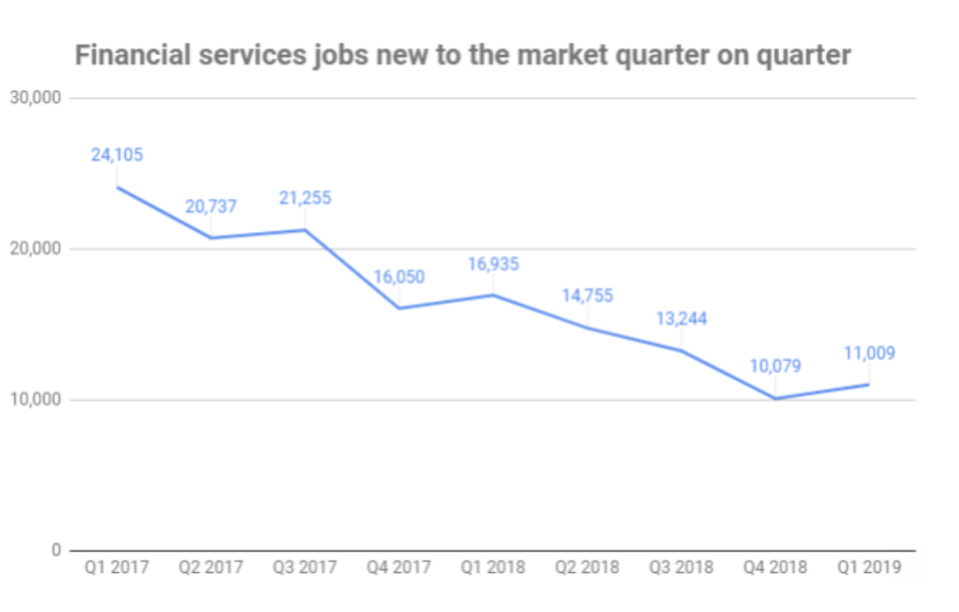Brexit helped drive a 50% drop in vacancies for London finance jobs

There maybe a rise in jobs available and those looking for new roles in the financial services area in London over the last quarter, but year-on-year figures show how much Brexit has damaged the sector’s recruitment space.
According to the Morgan McKinley London Employment Monitor, while there was a 9% increase in jobs available quarter-on-quarter, there was still a 9% decrease in jobs available year-on-year.
Furthermore, while the last quarter showed a 2% increase in job seekers compared to the last period, there was an overall 15% drop in professionals seeking jobs compared to last year.
“We closed 2018 with a dramatically poor jobs market, because it’s become virtually impossible for businesses to grow here, so we started 2019 on the back foot. We have under half the jobs and under half the job seekers we had at this time in 2017,” said Hakan Enver, managing director of Morgan McKinley Financial Services.

‘Here we are, still waiting for answers’
Enver said: “The inability of the government to reach consensus on a Brexit deal has crushed confidence among City employers. Even with all the uncertainty of the last few years, there was always an assumption that come 29 March 2019, we would have some answers. Yet here we are, still waiting.”
While the Brexit referendum was in 2016 and Article 50, the two-year mechanism that notifies that Britain will leave the EU, was triggered on 29 March 2017, the UK has still not officially sealed a deal or a date when the UK will leave the bloc.
Originally, the UK was meant to leave the EU on 29 March 2019. UK prime minister Theresa May sealed a deal with the EU last year, but after three attempts to pass it through Britain’s parliament, politicians rejected the deal. This has led to back and forths with Brussels for an extension to Article 50, in a bid to avoid a no-deal Brexit which is the legal default. Currently, the extension is until 31 October this year.
Brexit uncertainty is particularly worrying for the financial sector due to the lack of clarity around immigration rules, which could significantly hurt the workforce. Furthermore, there is still significant uncertainty over what the rules and regulations governing the sector will be.
READ MORE: Major UK recruiter makes a mint amid Brexit uncertainty
‘For the big banks, there are no extensions’
“With the Brexit deadline having been extended till the 31 October—the stress on businesses is showing no sign of letting up. The government had over two years to do its homework and complete the assignment,” said Enver.
“Right before the deadline, they finally decide to try to work with the opposition to protect the people, instead of their own political power? They didn’t do the homework, they didn’t complete the assignment and now they’re asking for one extension after the other as jobs continue to flow out of London with Dublin being by far the biggest beneficiary, followed by Luxembourg, Paris, Frankfurt, and Amsterdam. It’s astonishing.
“For the bigger banks, 29 March was the deadline—there are no extensions. They have rolled out their Brexit plans and are deftly deploying staff and other resources to key EU locations. It’s the smaller firms that are now being hit hardest, as they have fewer resources with which to plan and adapt,” said Enver.
Meanwhile, recruiters like Robert Walters (RWA.L) are making a mint from diversifying its business. The London-based specialise recruitment consultancy, which has presence across five continents, revealed in its latest trading update that the group net fee income up 10% year-on-year and that 72% of the group’s net fee income is now derived from outside of the Britain.
READ MORE: Brexit delay could drive up property prices in the UK

 Yahoo Finance
Yahoo Finance 
